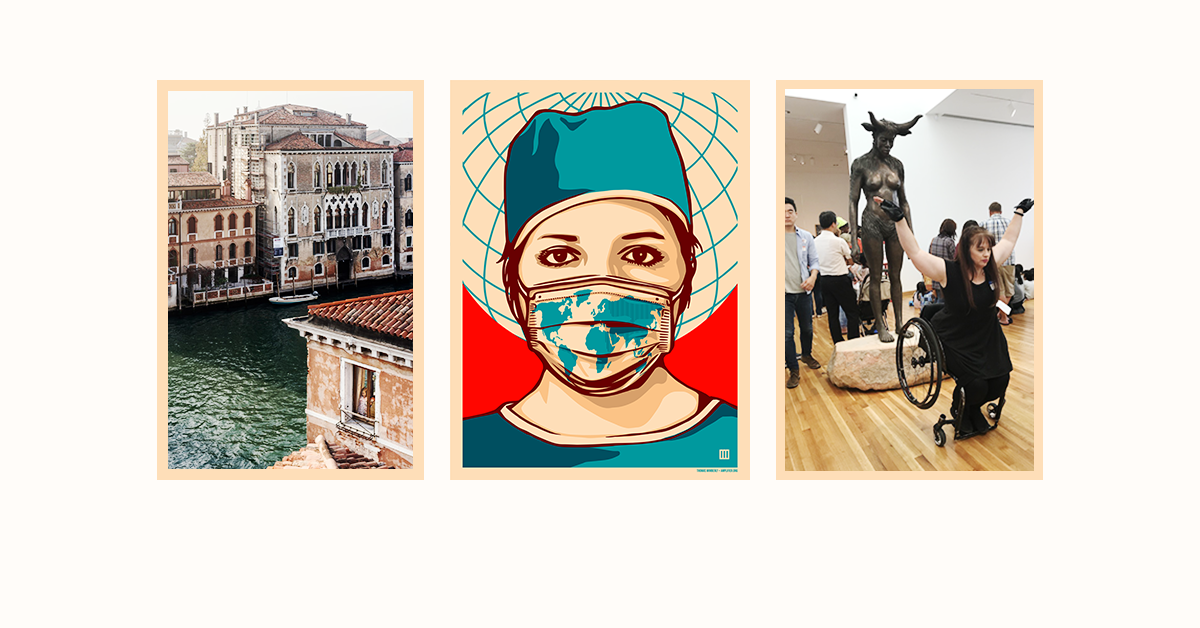Guest post by Paige Weber, Managing Editor of The Journal of Humanities in Rehabilitation
The Journal of Humanities in Rehabilitation (JHR) is a peer-reviewed, multimedia, open-access journal published in collaboration with the Emory Center for Digital Scholarship (ECDS). The purpose of this journal is to raise the consciousness and deepen the intellect of the humanistic relationship in the rehabilitation sciences. Its mission is to encourage dialogue among rehabilitation professionals, patients, families, and caregivers that describe the human condition as it experiences the impact of illness or disability. JHR recently published a new issue for Spring 2020.
In the new issue, JHR addresses the COVID-19 crisis in an editorial by Editor-in-Chief Dr. Sarah Blanton, titled “What is saving you now?” Here, Dr. Blanton shares the critical role of the humanities during times of crisis like the current pandemic:
“In the midst of this historical pandemic, there is no more important time in our profession, in our lives, in our world—to embrace the humanities.
The humanities provide tools to navigate uncertainty, tolerate ambiguity, and broaden moral imagination. The very nature of science and medicine conditions us to seek definitive answers in our fields, yet the art of caring lies in the ability to sit comfortably with not knowing facts—but knowing people. We learn the action that is inherent in stillness and the healing powers of simply being present with one another. When all the statistics or rising infection rates, estimated hospital overload dates, and ominous economic forecasts are set aside, what remains is the resiliency of the human spirit. Art, literature, and poetry serve to buoy our sagging moods, connect us across space and time with the deeper questions or meaning and purpose, beauty and truth, grace and forgiveness.”
While there are unprecedented challenges to health science education, Dr. Blanton remains hopeful:
“[…] I truly believe this cohort of clinicians, experiencing this pandemic, will emerge with exceptional levels of resiliency, compassion, cognitive flexibility, and critical thinking skills as well. Our world will be remarkable in ways we have yet to imagine.
The humanities offer us insight into what that new world may be, and provide a compass to lead us through this dark night, confident that dawn will come and spring persist.”

JHR‘s Spring 2020 Issue also includes a list of online COVID-19 Resources in this issue, gathered by Jamie Fleshman, SPT. The article, “COVID-19 Resources: Health, Humanities, and Pandemic Intersections,” provides links to resources for ethics, disability, a wide range of the arts, education, and clinical information – all collated from a humanities perspective. Readers are invited to access it frequently for inspiration during the weeks ahead.
Fleshman also honors the 30th Anniversary of the Americans with Disabilities Act (ADA) in this issue, with a historical overview of the ADA and its civil rights protections, and a timely and important editorial, “Toward True Equity: A Call For Further Revisions to the ADA.” In her editorial, Jamie identifies a critical contributor to American disability: the continued inaccessibility of public spaces, and she calls for change and a path towards “true equity.”
The Spring 2020 Issue also showcases Bethany Shieh, SPT, the winner of the annual physical therapy student essay contest co-sponsored by the ACAPT Consortium for the Humanities, Ethics, and Professionalism (CHEP) and JHR. In her essay “Searching Behind ‘No!’” Shieh illustrates how we can create space to understand the pain, suffering, and frustration that accompany and influence patient care, if we are willing to enter and dwell in our patient’s life experience.
The new JHR issue also features an Historical Perspectives in Art piece by Dr. Melissa McCune, an ECDS graduate student who is finishing her second year as the JHR’s Senior Digital Graduate Editorial Associate. Her article, titled, “How Art Embodies Story: An Exploration of Basquiat Through a Physically Integrated Dance Performance” reports on a recent dance project of Full Radius Dance (FRD)—a company that integrates disabled and non-disabled dancers—that interpreted the works of artist Jean-Michel Basquiat.
This issue also includes three papers of original critical rehabilitation scholarship, including one exploring how we rethink chronic pain through Frida Kahlo’s art. The artist Babs McDonald also shares her journey of recovery from an ischemic stroke through sketching and painting, a new and deeply satisfying pastime.
Since its publication of the Spring 2020 Issue on May 15, JHR has received feedback and encouragement from readers, including the following:
“An interest in humanities is not an optional extra or a luxury in rehabilitation, it is essential, helping you to understand the patient’s situation.”
—Derek Wade, Editor-in-Chief, Clinical Rehabilitation Journal
“Your writing was a good reminder to refocus on the good in the world and the strength / resiliency of the human spirit.”
—Emory student
“Once again — great work. This journal is so important! It is going to be these students and grads who we touch in simple ways through our teaching the journal, and getting them engaged that will continue to transform the profession.”
—Gail Jensen, JHR Editorial Board Member
In addition to Jamie Fleshman, who joined the JHR’s staff this year as a new Digital Graduate Editorial Associate, JHR welcomed another new staff member. Elizabeth Lummus, a Master of Public Health (MPH) Candidate at Emory University’s Rollin Schools of Public Health, joined the JHR staff this year through the Emory Center for Digital Scholarship and handled all the production and layout responsibilities for the Spring 2020 Issue. She received training for this new role from Dr. Kayla Shipp, who is a Digital Scholarship Specialist at ECDS. Kayla also previously helped redesign the JHR website in Fall 2018, which you can read about in our ECDS blog post from November 2018.
Visit the full Spring 2020 Issue on the JHR website here: https://www.jhrehab.org/

